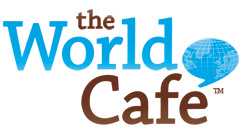Juanita Brown has been asked to speak at an academic symposium on “Reflection and Democracy” in Chicago early next month. The following is an excerpt from the reflection paper she wrote in preparation, the first and most personal of three little stories about conversation and civic engagement that couldn’t be more timely:
“Democracy begins in human conversation. The simplest, least threatening investment any citizen can make in democratic renewal is to begin talking with other people, asking the questions, and knowing that their answers matter.”
~William Greider, Who Will Tell the People
I remember as a child in Miami, Florida our home was always alive with conversations. They weren’t just any kind of conversations. They were conversations about the “big questions”—questions of justice, democracy, and civil rights. They were conversations about philosophical issues, social action, and campaigns to elect public officials who had integrity and guts. From those early conversations the civil liberties movement in Florida was born, nurtured, and grew into a potent force for decency and fairness at a time of great turmoil in the South.
How did that happen? How did my parents and a small group of kindred spirits find each other, begin to reflect on their democratic ideals, find the courage to survive cross-burnings, ostracism, and opposition, while nourishing friendships imbued with a spirit of community and commitment that have lasted a lifetime.
My dad, Harold Cowan, is 90 years old. My mom, Millie, is 87. They came to Miami in the 1940’s from an immigrant ghetto in South Philadelphia. Recently we filmed them talking about those days and the seminal role in their lives of the “Jefferson Club,” named for the Jeffersonian ideal of participatory democracy. My mom, Millie Cowan, spoke of the impetus for the Jefferson Club with the same passion she’s demonstrated for more than half a century:
“Right on the street in Miami where my sister lived they had signs that said No Negroes, Jews, or Dogs Allowed. And at the beaches there were signs that said all blacks had to get off the beach before dark or they would be subject to arrest. Can you imagine? We were very, very shocked and very incensed. It was also the McCarthy period and they were going after known liberals. We found out that the Unitarian Church had a social action committee, and we began to meet others who were also concerned about what was going on.
That’s when the Jefferson Club started. It was primarily a discussion group that met every other week in various people’s homes. We would assign a question or issue and people would bring in readings they thought illuminated the subject. It wasn’t always political. Sometimes it was philosophical. We had questions like “What is happiness? But more often than not, it turned to the political things that were happening in Miami.”
My dad continued:
“Those conversations were very inspiring. They raised me to a different level of thinking. The Jefferson Club made me start thinking about things outside of my own survival. And, being very pragmatic I said, hell, let’s start doing something about it! The Jefferson Club became a nucleus for social action in the community, so when an issue came up, you didn’t have to form an organization. The people and the friendships were already there. All you had to do was make a few phone calls and you had a ready made organizing committee. We each supported the others’ efforts. It was really a miraculous thing.“
My mother added:
“And it was during that period in the 1950’s that we founded the first local chapter of the American Civil Liberties Union in Florida. Today, fifty years later it’s still going strong with a lot of brilliant and wonderful young people–– young leaders who are working so hard to keep our democracy alive. We’ve seen tremendous social change take place over the years. All I can say is that we’ve had a lot of fun being involved with all these community betterment activities. We’ve enjoyed the most wonderful and meaningful relationships as a result of the Jefferson Club days with people who really had a lot of heart and cared about everyone having a voice.”
That was a key theme of my youth … the people’s democratic voice and our responsibility as citizens to keep our democracy alive. From leafleting in political campaigns, to creating social and legal services for poor people, to enduring cross burnings on our lawn because my parents invited African-Americans to our home–-I knew that the Jefferson Club readings and conversations I overheard in my parents living room, the thoughtful reflection that was integral to their discussions, and the committed actions my family and their friends took were because democracy was not a distant ideal. Rather democracy was a tender, vulnerable, living “being” that needed nurturing and protection by those who loved her.
Read the whole paper here: Download civicreflectiondemocracy.pdf
(108k)



0 Comments